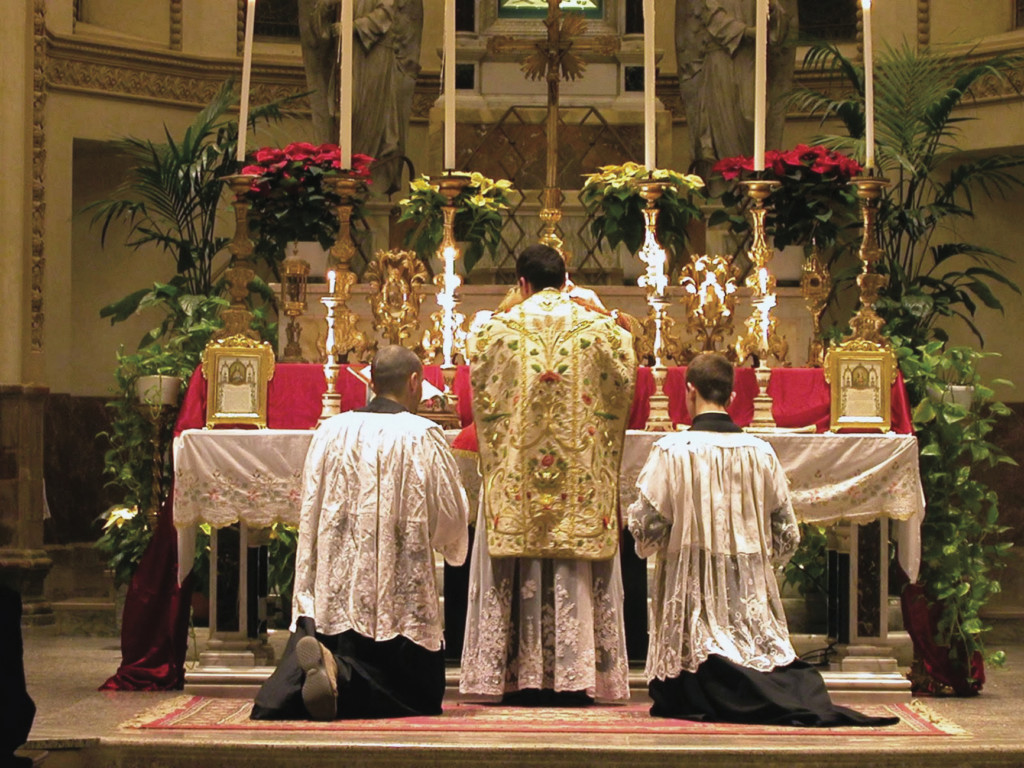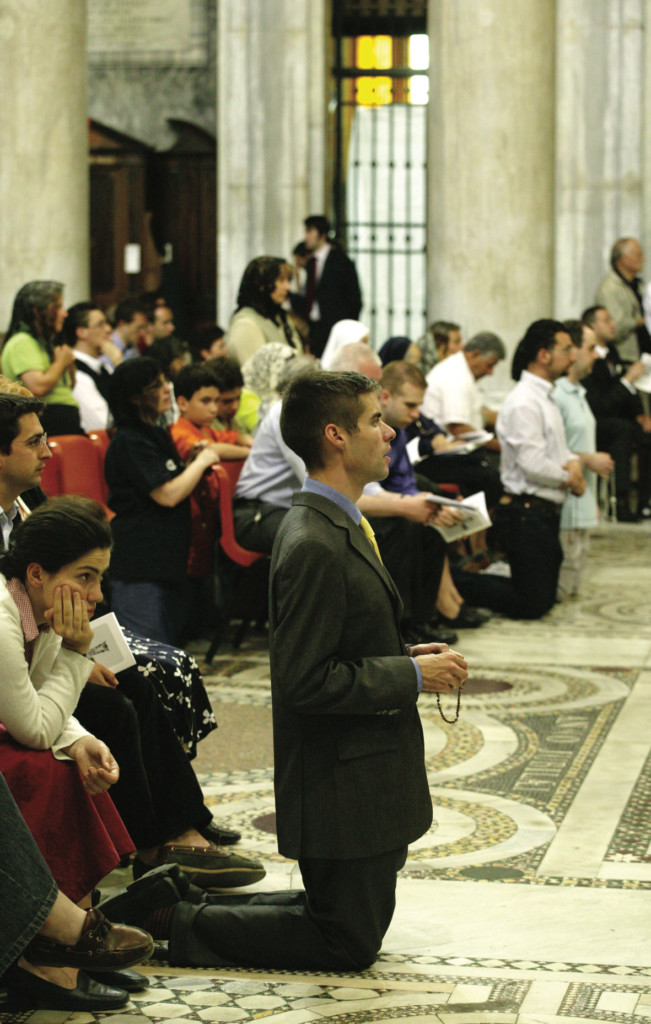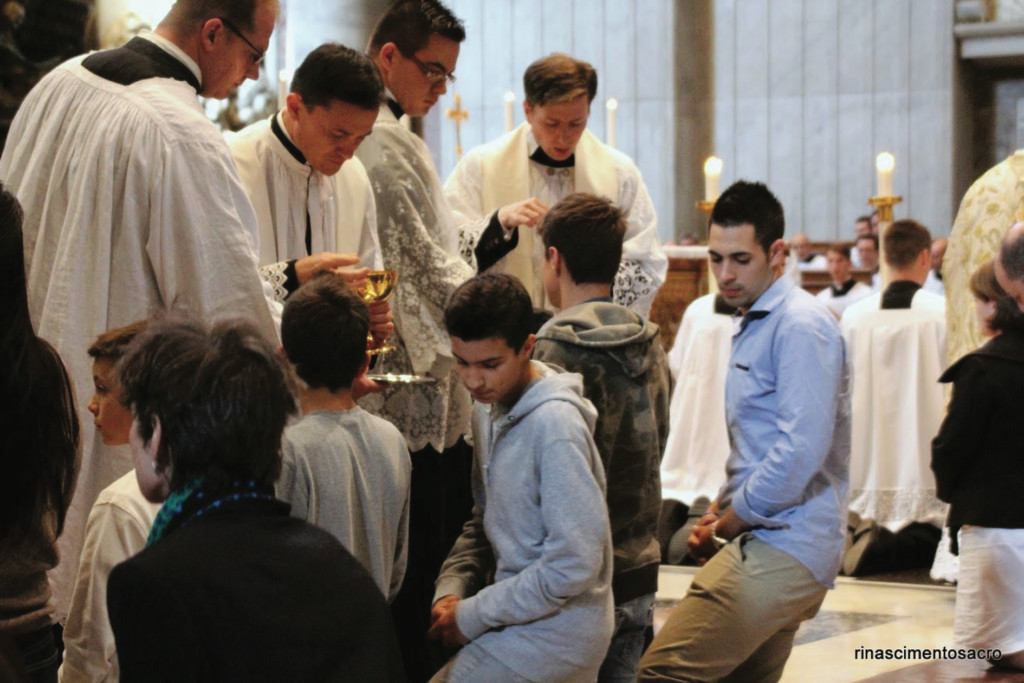“The crudest form of clericalism”

The reason for a Church government (as leaders, rather than sacrificial priests) is found in the community of faithful for which such government exists. Government exists per se for the protection of society and its way of life, so that society may achieve the ends for which human communities are formed; government is not the creator of society. So too, the pope and bishops are mandated to guard and pass on the tradition that has been handed down to them (2 Thess. 2:15), and are not to repudiate or abrogate it, or concoct their own novel version. The Church’s tradition, both belief and practice, is not theirs, with which they may do as they wish. The Church’s tradition belongs to the whole faithful. Of this tradition, the bishops (including the pope) are the guardians and servants. They can never be the creators nor the owners of the Church’s doctrine, practice or liturgical life, but are charged with protecting and promulgating the common religious inheritance of the whole faithful. For popes and bishops to behave as if the Church’s tradition is their belonging, with which they may do as they please, with the rest of the faithful just having to accept it, marks the crudest form of clericalism.
Sebastian Morello,
“Revolution and Repudiation: Governance Gone Awry”
“Whoever obeys in these conditions disobeys God”
Obedience — and this is an error that finds its deepest roots even in the pre-conciliar Church, it must be said — is not an end. It is a means of sanctification. Therefore, it is not an absolute value, but rather an instrumental one. It is a positive value, very positive, if it is ordered towards God. But if one obeys Satan, or his servants, or error, or apostasy, then obedience is no longer a good, but rather a deliberate participation in evil.
Exactly like peace. Peace — the divinity of today’s subversion — is not an end, but rather an instrument of the good and the just, if it is aimed at creating a good and just society. If it is ordered towards creating or favoring a society that is Satanic, malignant, erroneous, and subversive, then “peace” becomes the instrument of hell.
We must be “pleasing not to men, but to God, who tests our hearts” (1 Thess 2:4). Exactly! Therefore, whoever obeys men while being aware of facilitating evil and obstructing the Good, whoever they may be — including the ecclesiastical hierarchy, including the pope — in reality becomes an accomplice of evil, of lies, and of error. Whoever obeys in these conditions disobeys God. “Because no slave is greater than his master” (Mt 10:24)… [T]he first concern ought to be to always follow and defend the Truth, not the cloying, obsequious, and scrupulous groveling which is the spoiled fruit of a misunderstood Tridentinism.
Massimo Viglione,
“They Will Throw You Out of the Synagogues”
“Dividing Catholics at the deepest possible level”
For a religion predicated on tradition, the suppression of tradition makes no sense unless the goal is to change that religion fundamentally. By “unity,” the pope means universal acceptance of that project. He is demanding that all Catholics view uncritically changes that have obviously weakened the faith. If they don’t, they are “divisive.” The pope, of course, embodies the very division that he claims to deplore. He is dividing Catholics at the deepest possible level — from Catholic tradition itself. A “unity” rooted in heterodoxy is a sham. As the modernist Church stumbles from scandal to scandal, he dares to hold it up as the model of Catholicism to which all must aspire. His latest act of ecclesiastical tyranny is nothing more than an attempt to extract from the most faithful Catholics a pledge of allegiance to that crumbling Church. The spectacle of a pope disloyal to Catholic tradition issuing loyalty litmus tests is an outrageous one. By disregarding the authority of past popes, Francis erases his own. He is not solving crises but creating them so that his modernist revolution can be fulfilled. In the past, orthodox Catholics defended the pope from enemies of the faith. Now they must defend the faith from a pope who has shown himself repeatedly to be their enemy.
George Neumayr,
“The Upside-Down Church”
“Tradition stands above the Pope”
Pope Francis prohibits Masses in the old rite in parish churches; he requires priests to obtain permission to celebrate the old Mass; he even requires priests that have not yet celebrated in the old rite to obtain this permission not from their bishop, but from the Vatican; and he requires an examination of conscience of participants in the old Mass. But Benedict’s motu proprio Summorum Pontificum reasons on a totally different level. Pope Benedict did not “allow” the “old Mass,” and he granted no privilege to celebrate it. In a word, he did not take a disciplinary measure that a successor can retract. What was new and surprising about Summorum Pontificum was that it declares that the celebration of the old Mass does not need any permission. It had never been forbidden because it never could be forbidden. One could conclude that here we find a fixed, insuperable limit to the authority of a pope. Tradition stands above the pope. The old Mass, rooted deep in the first Christian millennium, is as a matter of principle beyond the pope’s authority to prohibit. Many provisions of Pope Benedict’s motu proprio can be set aside or modified, but this magisterial decision cannot be so easily done away with. Pope Francis does not attempt to do so—he ignores it. It still stands after July 16, 2021, recognizing the authority of tradition that every priest has the moral right to celebrate the never forbidden old rite.
Martin Mosebach,
“Mass and Memory”

“The ancient Mass will be able to reach more and more people”
The ancient Mass is not theologically inert. It exerts a centripetal force on the Catholics attending it, drawing them back to the center of orthodoxy. Catholics attending it reveal to researchers that they accept the hard teachings, on divorce and sexuality, as well as on the Real Presence, to far greater extent than do those who attend the reformed Mass. Those attached to the Old Mass often experience this, in themselves and in others. This Mass has the power to draw in nonbelievers and the lapsed, as well as to inspire the fervent. In a time when the moral authority of the Church is at a low ebb, and people will not accept the truth of things just because the Pope or Bishops say so, it is a valuable spiritual means of drawing people into the truths entrusted to the Church by Christ….
The movement for the Traditional Mass will bounce back. Things will not be the same again, however, because after such a series of policy reversals papal prestige will be seriously weakened. In the future, the fate of the New and Old Masses will not be determined by the fancies of the reigning Pope, but on the basis of their pastoral and theological merits, worked out in practice, locally.
This may be a bit chaotic, but the ancient Mass will be able to reach more and more people…. We will see its power to draw people in, not to a private experience which they happen to prefer, but to the center of the Church’s spirituality and teaching.
Joseph Shaw,
“Is the Missal of Paul VI the Unum Necessarium?”
“They do not legislate liturgy per se”
Recall a fact that seems astonishing to us today, but would have surprised no one for most of the Church’s history: the liturgy of the Western or Latin-rite Church existed in its many varieties for 1,500 years — for fully fifteen centuries — before any pope wielded papal authority to codify or define a liturgical book. In response to the Protestant Revolt, St. Pius V took the grave step of establishing a definitive edition or editio typica of a rite that had been used for century after century as an authoritative custom. So far from “creating his own missal” (as some people ignorantly continue to say), Pius V took the most conservative action possible in the circumstances: he acted precisely to conserve tradition in the face of a massive heretical onslaught with its innumerable innovations…. The Pope, or others in the hierarchy, can legislate for the liturgy, in the sense of the conditions surrounding it, the printed editions of it, the qualifications of ministers for it, etc., but they do not legislate liturgy per se. Fullness of power means power to do anything that can (lawfully) be done, not power to do whatever the wielder of it wants. If the statement “the pope can change the liturgy as he pleases” is accepted without qualification, then tradition means essentially nothing. And this is not a Catholic view (and never has been), but a nominalistic and voluntaristic one.
Peter Kwasniewski,
“The Pope’s Boundedness to Tradition”
“All they really ask is to pray in peace”
To oppose the evil “integralists” of the Society of Saint Pius X or the disciples of Abbé Barthe to the good trads of certain Ecclesia Dei communities is a dialectical vision of the life of the Church already denounced in his day by Jean Madiran: “The terms ‘integralists’ and ‘integralism’ were born and spread as polemical sobriquets” (L’intégrisme: Histoire d’une histoire [in English the term “fundamentalists” tends to be used]). They live by the same faith, receive the same sacraments, are confronted with the same difficulties in the education of their children, and often attend the same places for Mass.
This is undoubtedly what too many observers forget: the crisis of the Church persists, and is even growing. Generally speaking, participants in the traditional Mass are only looking to pray in a ceremony that is not a “self-celebration of the community” (J. Ratzinger) but a true liturgy, transcendent and leading them to God. The priorities of these lay people could be enumerated as follows: first the faith and the sacraments, then the hierarchy, then canon law.
They love and respect the priests who preach to them the Catholic faith in its integrity. Such priests remind them that the Mass is a sacrifice, that the Blessed Virgin Mary is the Immaculate Conception, that hell exists and is not empty, etc. How many parishes preach these truths? Too few! The priority in most homilies is rather the obligation to get vaccinated or to welcome migrants.
Traditionalist laymen are, of course, not much concerned with the concelebration of priests and generally have little interest in the Acts of the Second Vatican Council, a dated pensum of 800 pages. They have no intention, however, of “returning in due course to the Roman rite promulgated by Saints Paul VI and John Paul II.” They know what they have left and why. All they really ask is to pray in peace and to live, quietly, in the faith of their fathers. What harm is there in that?
Jean-Pierre Maugendre,
“Traditionis Custodes: Divide and Conquer?”
“Hyper-papalism is a consequence of the liturgical reform”
I think this hyper-papalism is itself a consequence of the liturgical reform. The old Mass, a product of many centuries of organic development and slow reform, provided a deep spiritual connection for Catholics to the lives of saints going back ages. The Mass itself was the center of Catholic faith, devotion, and mystery. Having severed the connection to what the Eastern Church calls “holy tradition,” the search for that tie to the divine has brought about a mystification of the papacy. Catholic media and apologists have gotten into the habit of treating the bishop of Rome’s thoughts, attitudes, predispositions, and initiatives as if they were the main show of the Catholic faith—the primary theater of God’s will for the world today. They point to the curia— which we know from history and current gossip to be a den of the most vicious politicking—and presume that this is where the magic happens. Well, not in Catholicism, I’m afraid.
Michael Brendan Dougherty,
“Where Is Peter?”
“Traditionis Custodes… calls into question the Church’s own self-understanding”
This is not to say that those who prefer the New Mass call into question the Church’s defined (and thus irrevocable) Eucharistic doctrines; but it is to say that those who ideologically oppose the traditional Mass do tend to call into question the Church’s defined doctrines. What the new rite expresses obscurely, the old rite expresses limpidly and unmistakably, which is why no one who rejects the dogmas of Trent can feel at home in the old Mass. It must be stamped out if the revolution is to succeed. Those who may prefer the new forms, all the while continuing to adhere to the perennial Catholic religion (unlike the committed neo-modernists), need to understand that the war against the traditional Mass is also a war against the Catholic faith itself….
The pressing problem in the Church today, then, is not: Do traditionalists accept Vatican II, but rather: Do the antitraditionalists accept everything that came before Vatican II?[1] The common lot of people attending Latin Masses today do “accept Vatican II,” inasmuch as it was legitimately convened and concluded by legitimate popes; yet they are not willing to let “accepting Vatican II” be a pretext or an occasion for rejecting or neglecting what came before Vatican II. And this is the real reason for the rage of the anti-traditionalists….
Traditionis Custodes, therefore, does not merely call into question Pope Benedict XVI’s entire theological legacy, but — what is far more serious — calls into question the Church’s own self-understanding.
If the premises of Traditionis Custodes are true, then Catholicism loses the inner coherence and historical continuity which are a consequence of the principle of non-contradiction and which are essential to the plausibility of the Church’s claims to be the authorized teacher of divine revelation.
One of the tragic ironies of Traditionis Custodes is that Pope Francis, in his quest for unity, focuses on supposed breaches in unity caused by those attached to the traditional Mass but passes over in complete silence the very real disunity coming from the growing schism in Germany, the diversity of pastoral practices occasioned by his own Amoris Laetitia, the scandal of celebrity priests and even some bishops who promote LGBT ideology in rejection of Church teaching, etc. Pope Francis has tolerated or even actively abetted these offenses against unity, something everybody knows, even if many bishops are afraid to acknowledge this publicly. Even if some caustic traditionalists occasionally fall into faults against charity which are unfortunately encouraged by social media, it is not a bad tone which undermines the unity of the Church, but error, since all Catholics are bound to be united in the profession of the same (immutable) faith. To the extent that doctrinal error goes unchecked, to that extent the unity of the Church is undermined.
A Catholic Priest,
“The ‘Hermeneutic of Rupture’ Cancels Pope Benedict—and the Council”








Facebook Comments